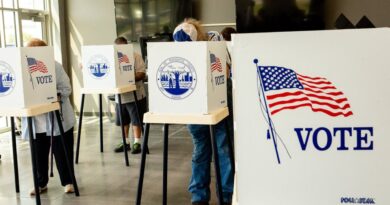Kraken lawyers appear to comply with sanctions order for conspiracy-laden election lawsuit
Lawyers loyal to former President Donald Trump appeared to comply with a federal court order requiring them to complete at least a dozen hours of continuing legal education as a punishment for their involvement in a lawsuit to overturn the results of Michigan’s 2020 presidential election.
Some of the sanctioned lawyers previously blasted the training as a violation of their First Amendment rights. They failed in their last-minute attempt to suspend the order until an appeals court has a chance to weigh in on whether they must also pay a hefty fine for their conspiracy-laden challenge to the last election.
U.S. District Court Judge Linda Parker imposed the penalty on Sidney Powell and other lawyers who promulgated election conspiracies, requiring them to complete and pay for at least six hours of coursework on pleading standards and at least six hours on election law from a non-partisan organization. She ordered the attorneys to submit proof that they completed the legal training by Friday.
All nine attorneys submitted paperwork attesting that they completed legal training to comply with the sanctions order. Powell, who submitted her filings with a couple hours to spare before the midnight deadline, indicated that she completed several classes to comply with the order, including “The High Cost of Poor Legal Writing.”
Michigan attorney Stefanie Lynn Junttila filed her affidavit less than an hour before the deadline. Unlike the other attorneys, Junttila’s affidavit was not notarized and she did not submit additional documentation detailing the coursework she took.
Lawyers who fail to comply with the order might be held in contempt of court and face additional penalties.
Powell’s Michigan lawsuit to thwart the will of voters by naming Donald Trump the winner of the state’s election despite Joe Biden receiving more votes mirrored others filed across the country in the battleground states. It was part of a legal strategy Powell said would “release the Kraken” – a reference to the film “Clash of the Titans.” In her ruling rejecting the lawsuit, Parker surmised that the lawyers’ true aim was to chip away at voters’ confidence in elections and argued the sanctions she imposed were necessary to deter baseless challenges to future elections.
Even after Parker ruled against the effort to overturn the election, three of the plaintiffs in the lawsuit signed a fake certificate that tried to award Michigan’s Electoral College votes to Trump.

Hundreds of pages submitted to the court describe the length and content of the courses the sanctioned lawyers took such as “Vote by Mail, Early Voting and Digitized Election Administration” and “The Fundamentals of Pleading Practice in State and Federal Court.” Brandon Johnson, one of the sanctioned attorneys, attended classes called “How to Succeed as a Trial Lawyer” and “Newbie Litigator School: The Federal Rules of Civil Procedure.”
Documents submitted by Georgia attorney L. Lin Wood indicate that he paid nearly $1,500 Thursday for his courses, including training on how to format briefs and pleadings in Microsoft Word.
Parker ordered the legal training on top of $175,250.37 in legal fees incurred by the city of Detroit and others who defended against the lawsuit. She also referred her sanctions order to attorney disciplinary authorities across the country for investigation and possible suspension and disbarment.
With the deadline to complete the continuing legal education looming, Powell and five of the other sanctioned lawyers asked an appeals court to halt the continuing legal education requirement, arguing that it infringed on their First Amendment rights. They filed an emergency motion making the request less than two weeks before the deadline. Junttila waited until just three days before the deadline to file her own motion seeking to stay the district court’s order.
But on Thursday, a three-judge panel from the U.S. Court of Appeals for the Sixth Circuit denied the requests. The orders chided the attorneys for their last-minute filings and told them that they should have first asked the district court to suspend the sanctions order.
The attorneys also asked the appeals court to stop the referral of the sanctions order to attorney disciplinary authorities. But copies of Parker’s sanctions order were already sent in late August to the Michigan Attorney Grievance Commission and disciplinary authorities in each state where the lawyers are licensed to practice.
Lawyers punished by Parker have also asked the appeals court to reverse the monetary sanctions she imposed, which would cost them about $19,500 each. In her December order that determined the price each attorney must pay for trying to overturn the election, Parker automatically suspended the payment pending the resolution of the appeals.
Emily Newman of Virginia and Wood have each filed their own appeal while Powell and the other attorneys banded together in a separate filing. Newman and Wood claim that they did not file or sign onto the lawsuit and played a minimal role in the case. Junttila has indicated that she also plans to appeal the sanctions order.
The appeals court has not yet decided whether the attorneys will ultimately have to pay up.
More:Lawyers who tried to overturn Michigan’s election argue they shouldn’t be punished
‘The people have spoken’:Michigan judge rejects lawsuit from disavowed Trump attorney
Sanctioned lawyers call non-partisan legal education “flagrant First Amendment violation”
Powell and five of the other sanctioned lawyers argued the requirement to complete legal coursework is “blatantly illegal under the First Amendment.” They called it an “indoctrination remedy” that amounts to “viewpoint discrimination.”
They asserted that it is “a flagrant First Amendment violation” to force them to take continuing legal education from a non-partisan group, deeming the requirement a “content-based restriction.”
Lawyers for the City of Detroit slammed the argument.
The right to free speech laid out in the First Amendment “does not protect individuals from being compelled to listen to speech with which they disagree,” they wrote in a court filing responding to the claim. “The suggestion that non-partisan continuing legal education is some type of indoctrination or political ‘re-education’ is patently absurd.”
The sanctioned attorneys countered that the freedom to choose which courses to take to comply with the order is a “protected expressive activity” and that Parker limited their free speech rights “for partisan reasons,” pointing to her suggestion that the attorneys sought to undermine voters’ faith in the 2020 presidential election.
Junttila echoed the argument in her motion filed with the appeals court, writing that the continuing legal education would “force her to listen to twelve hours of speech the District Court deems politically acceptable.”
While most of the attorneys merely laid out the classes they took in their affidavits, Powell appeared to double down on her criticisms of the sanctions order in hers.
She noted that she watched videos featuring prominent Democrats, such as Georgia gubernatorial candidate Stacey Abrams and former presidential candidate Amy Klobuchar, whose name she misspells.
In a separate filing, Powell provided what seemed to be sarcastic remarks and pointed criticisms of Parker. Comments regarding a panel on the late U.S. Supreme Court Justice Ruth Bader Ginsberg’s legacy on voting rights reads, “Sensational panel!!!” and “Delightful and engaging conversation.”
Another comment said one presentation provided “good reminders of the judges’ perspectives as a case proceeds” while another offered “reminders to proceed carefully and not have your pleadings misconstrued.”
In her affidavit, Powell wrote that it was difficult to find election law courses to comply with the order and supplemented her coursework with videos she said reveal the vulnerabilities of voting equipment to hacking. She said she sat for one course on cyber attack techniques that “discusses how difficult it is to identify hacking and hackers, and how most high-powered hackers are located outside the United States.”
Her lawsuit falsely alleged the election equipment manufactured by Dominion Voting Systems was crafted by confederates of the deceased Venezuelan dictator Hugo Chavez and was subsequently manipulated to favor Biden over Trump.
There is no evidence that voting systems used in Michigan in 2020 manipulated the vote count.

More:Will sanctioning Sidney Powell in Michigan prevent the next Big Lie lawsuit?
A last-minute request
The lawyers seeking the appeal have repeatedly claimed that they were treated unfairly in the district court.
They argue that they were portrayed as “overwrought, dangerous lunatics” and wrote that they “were afraid to go back to a district judge who had taken such a vengeful attitude towards them,” in their court filings.
And they disagreed that they procrastinated in filing their motion to suspend the continuing legal education mandated by Parker.
“Appellants have not sought a stay at an earlier date because they thought it prudent to do so only after their First Amendment and other merits arguments were fully fleshed out,” the motion from Powell and five of the other sanctioned lawyers states. They claimed that it was appropriate to wait to ask the court to suspend Parker’s sanctions order only after they filed their brief to support their appeal.
“Having now completed their initial brief in this Court, Appellants are confident of the soundness of their position and so hazard to take up this Court’s time with their stay application,” they wrote.
The appeals court didn’t buy their arguments.
“The Attorneys’ assertion that it was prudent to delay seeking a stay until they filed their principal brief is inexplicable,” reads the appeals court order denying the motion to stay the non-monetary sanctions. And the order called the attorneys’ argument that the district court would not have handled their request fairly “unsupported speculation.”
The brief from Powell and other lawyers appealing Parker’s sanctions — filed the same day as motion requesting a stay — came after they bungled their initial filing, which did not comply with court rules.
In their corrected brief, they pointed to widespread and false claims of election fraud to argue they should not face penalties for their lawsuit to overturn the results.
“Millions of Americans believe the central contentions of the complaint to be true, and perhaps they are,” the brief states.

The sanctioned lawyers also referred to their clients as “public officials,” but the individuals who brought the lawsuit included three Republicans nominated to serve as presidential electors in the event of a Trump victory in 2020 and local GOP leaders.
The signatures of three GOP nominees to serve as presidential electors — Timothy King, Marian Sheridan and John Haggard — appear on a fake certificate sent to the National Archives and former Vice President Mike Pence that attempted to award Michigan’s Electoral College votes to Trump.
Staff writer Dave Boucher contributed to this report.
Clara Hendrickson fact-checks Michigan issues and politics as a corps member with Report for America, an initiative of The GroundTruth Project. Make a tax-deductible contribution to support her work at bit.ly/freepRFA. Contact her at chendrickson@freepress.com or 313-296-5743. Follow her on Twitter @clarajanehen.


